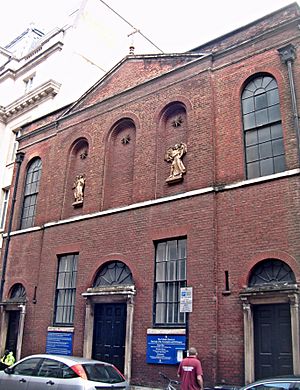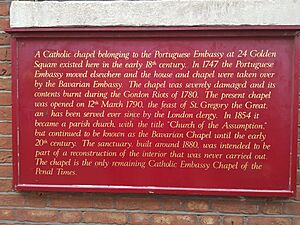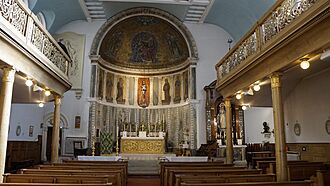Church of Our Lady of the Assumption and St Gregory facts for kids
Quick facts for kids Church of Our Lady of the Assumption and St Gregory, Westminster |
|
|---|---|
 |
|
| 51°30′40″N 0°08′17″W / 51.51123°N 0.13792°W | |
| Location | Soho, Westminster, London |
| Country | England |
| Denomination | Catholic |
| Website | Church of our Lady of the Assumption and St Gregory, Westminster |
| History | |
| Consecrated | 24 July 1928 |
| Architecture | |
| Heritage designation | Grade II* |
| Designated | 24 February 1958 |
| Architect(s) | Joseph Bonomi the Elder |
| Years built | 1789–90 |
| Administration | |
| Diocese | Personal Ordinariate of Our Lady of Walsingham |
The Church of Our Lady of the Assumption and St Gregory is a Catholic church located on Warwick Street in Westminster, central London. It is special because it is the oldest Catholic church in England that has always been Catholic. Other churches were used by Anglicans before becoming Catholic again.
This church was once known as the Royal Bavarian Chapel. Many Catholic churches in London started as chapels inside foreign embassies. This was because of laws that made it difficult for Catholics to practice their faith openly. The church was built between 1789 and 1790. It was designed by Joseph Bonomi the Elder. It is the only Catholic chapel from the 1700s still standing in London. It is also a Grade II* listed building, which means it is a very important historical building. Today, the church is run by the Personal Ordinariate of Our Lady of Walsingham. This group helps people who used to be Anglican become Catholic. The church acts as their main church.
Contents
History of the Church
The story of this church began in the 1730s. At that time, it was a chapel inside the Portuguese Embassy on Golden Square. During this period, laws in England made it hard for Catholics to worship freely. So, many Catholic chapels were set up inside foreign embassies. These embassies offered protection.
The most famous ambassador at the Portuguese Embassy was the 1st Marquis de Pombal. He later became a very powerful leader in Portugal. Even though the chapel was officially for embassy staff, many Catholics in London used it. It had five chaplains, which was more than enough for the ambassador and his team.
Changes and Rebuilding
In 1747, the Bavarian embassy took over the chapel. In 1780, during the Gordon Riots, the church's furniture and decorations were destroyed. The only part of the building that was damaged was the front. The Bavarian ambassador at the time, Count Haslang, asked for £1,300 to cover the damage.
A few years later, in 1788, a new church was designed by Joseph Bonomi the Elder. He was an Italian architect who had moved to London. This new church was meant to be fully controlled by the Catholic leader in London. Many important Catholics helped pay for it. The leader of Bavaria, Karl Theodor, was very happy. He said his chapel had helped keep the Catholic faith alive. The Bavarian leaders continued to donate money every year until 1871. Until then, prayers were said for the King of Bavaria, and the church was called the Royal Bavarian Chapel. The new church was opened in 1790 and named after St Gregory the Great. This building is mostly the same church you see today.
Later, John Francis Bentley, a famous architect, designed some new parts for the church. Only some of his plans were built. You can see his work in the side altar dedicated to Mary. This altar has his first mosaic of a human figure. He also designed the sanctuary, which shows the Coronation of the Virgin Mary. This part looks like an old Roman church.
Famous Visitors and Events
The church has been important to many famous Catholics. During a time when King Edward VIII gave up his throne in 1936, Queen Mary prayed at the church. She prayed in front of a statue of Our Lady of Warwick Street. This statue is a copy of the famous Our Lady from the Rue du Bac. Queen Mary also sent flowers to the statue every week until she passed away.
Many well-known Catholics have worshipped here. In 1853, a special Mass was held for Queen Maria II da Gloria. This event was even shown in the Illustrated London News newspaper. Other famous people include Maria Fitzherbert, who was secretly married to King George IV. The young Cardinal Newman also attended. Later in his life, Cardinal Newman said that if important saints like St Athanasius or St Ambrose were in London, they would go to Warwick Street to worship.
The Irish politician Daniel O'Connell regularly visited the church when he was in London. The famous Victorian explorer, Sir Richard Burton, was married here. The novelist Evelyn Waugh also had his second wedding at the church in 1937. In 1983, the funeral Mass for Ralph Richardson, a well-known actor who regularly worshipped there, was held at the church.
The Church Today
In 2013, the church was given to the Personal Ordinariate of Our Lady of Walsingham. Since then, Msgr Keith Newton has lived at the church's house. The church has also brought back its tradition of having a choir. They perform a wide range of music, from early 1900s Anglican music to pieces by Mozart. The church serves as the main church for the Ordinariate.
Church Exterior
The outside of the church is made of plain brick. It was stained red in 1952. The brick front was made to look simple on purpose. This was because the earlier chapel had been destroyed. The golden stars and angels you see on the front today were added in the 1950s. The building has three sections and two levels.
Church Interior
The inside of the church still has some of its original decorations from the Georgian period. However, the church was updated and changed in the Victorian era. The first changes were made in 1853 by John Erlam. During this time, a bas-relief sculpture of the Assumption was placed above the altar. This sculpture was made by John Edward Carew.
A second set of changes happened starting in 1874. These were led by John Francis Bentley, who also designed Westminster Cathedral.
See also
 In Spanish: Iglesia principal de Nuestra Señora de la Asunción y San Gregorio (Londres) para niños
In Spanish: Iglesia principal de Nuestra Señora de la Asunción y San Gregorio (Londres) para niños
- Embassy chapel
- St Etheldreda's Church, London
- Sardinian Embassy Chapel
- St James's, Spanish Place
 | George Robert Carruthers |
 | Patricia Bath |
 | Jan Ernst Matzeliger |
 | Alexander Miles |



